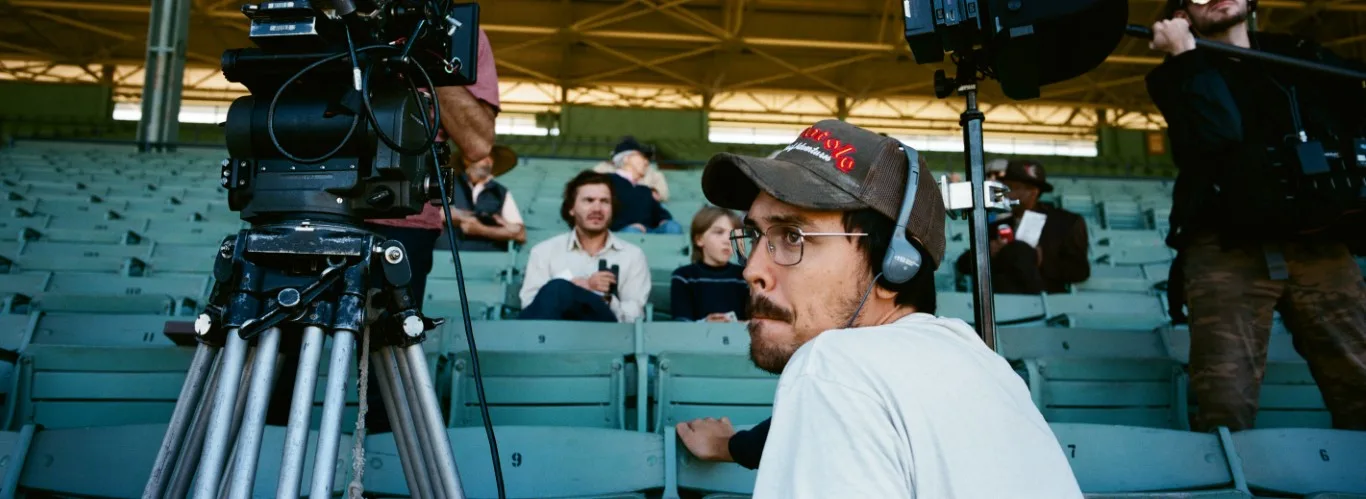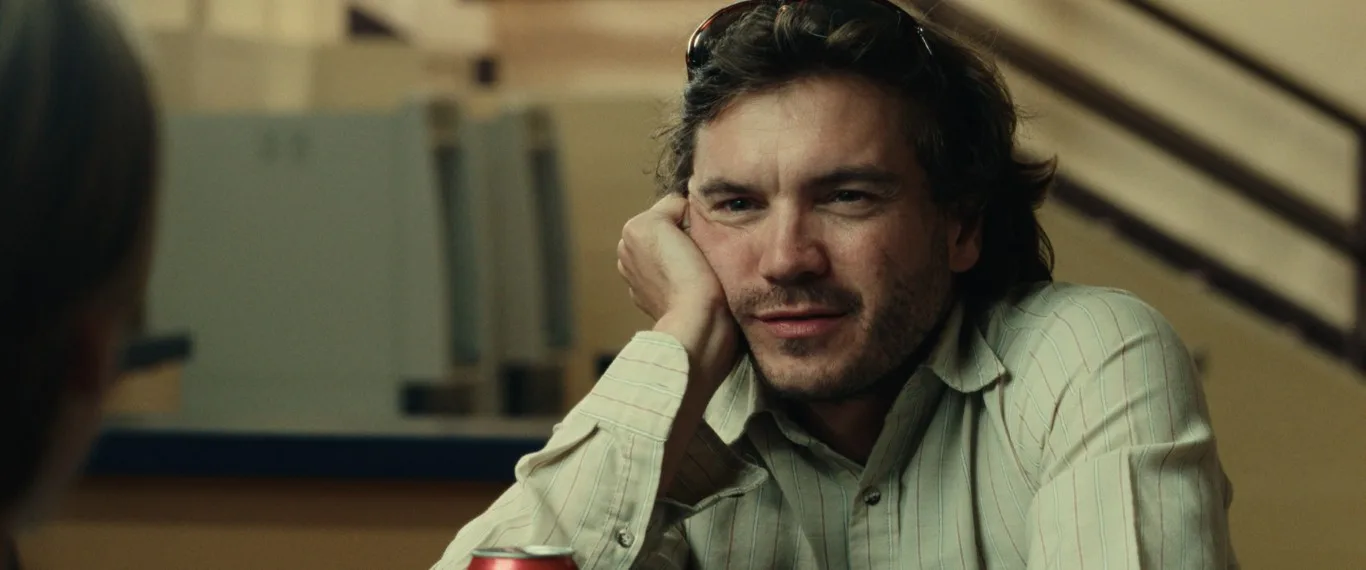Bennett Watanabe’s “Stooper” tells the story of a boy (Valor Hirsch) on his tenth birthday. Presumably, his mom is at work (or out somewhere) while he waits for his father (Emile Hirsch, Valor’s real father) to pick him up on his weekend with him. The boy gets a $10 bill in one of the many birthday cards he opens on his dining room table and adds it to a small pile of money he keeps under his bed. We later find out he has been saving for a cool bike. His father picks him up without a plan for the boy on his tenth birthday, but coyly suggests going to the horse track.
The majority of “Stooper” takes place at the track where the boy’s father asks him, “Who do you like in the second?” making sure the boy understands it’s not who do you “want,” but who do you “like”? There’s something about Captain Midnight that captures the boy’s interest. The father explains “odds” to him and that Captain Midnight is a bad bet (10-1 odds). The boy insists. It’s his money, he can do whatever he wants with it. Captain Midnight, it is. From there, the boy and his father fall into the trap that is the story of many gambling addicts, and we start to wonder if maybe these two are better off if they lose everything.

Something about “Stooper” reminded me of Richard Linklater’s “Boyhood,” where again, the father gets his son on weekends and maybe doesn’t always make the best choices of where to go and what to do, and the boy surprises him by how wise and thoughtful he can be when it comes to real-life problems. Of course, Emile Hirsch’s character does not want to hear about what he and his son should do with their money, even though we know damn well the boy is right. We stay with them on this journey to see who will make the smarter choice and who will ultimately prevail.
Watanabe knows how to build suspense that lasts throughout the film without compromising the more important aspects of the story. Of course, it’s not about whether or not they go home with a big bag of winnings, but whether or not the boy can ever truly look up to his father as a role model. Watanabe is smart not to labor this point with a confrontation between the two, but with a final moment that will linger in both their lives forever. The boy might not respect his father, but he can help him. The father is too desperate to look at the bigger picture of what he’s trying to do with his own son.
“Stooper” is a terrific father-son story with two outstanding performances at its center. Casting a real-life father-son duo, especially one as strong as this, may make it a more interesting curiosity item, but maybe there’s something going on here between the two that we’re not privy to. Emile Hirsch has always been a fine actor with a great career. Maybe he’s trying to tell Valor, who shows much promise with this debut role, to be careful how you handles success. You can lose it without even knowing it.
Q&A with director Bennett Watanabe
How did this story come about?
I’d been wanting to do something at a horse track for years. It always felt like such a fascinating place to explore in a short film. After tossing around some ideas for a story, I remembered a photo I took a while back of a young kid kicking a ball around at a racetrack while his dad watched the horses. And that kinda sparked the father-and-son thing.
Tell me about the casting. Did you know Emile and Valor Hirsch already?
I didn’t know Emile personally before “Stooper,” but I’ve been a huge fan of his work for a long time. “Lords of Dogtown” was a fundamental part of my childhood, having grown up skating and surfing in Venice Beach. So, when we started thinking about casting, he was our dream choice. And then I saw a picture on his Instagram of Emile and Valor, where Emile was wearing a funny “Once Upon A Time in… Hollywood” T-shirt. And they were just the perfect fit to play these roles. One of our producers, Eliel Ford, was able to track down Emile’s information through a friend, and we sent him the script. He responded well to the material. That led to a meeting with Emile and Valor, and a few months later, we were at Santa Anita Park shooting our little movie.

This is Valor’s first film. Can you tell me what it was like for him to act alongside his dad for the first time?
I think he had a blast doing it. I mean, it’s gotta be really fun to be allowed to yell at your dad without any repercussions, right? But it definitely helped Val a lot to have his dad around to show him the ropes and make him feel at ease on set. They rehearsed a lot, and we all spent time together workshopping the characters and the lines, so it felt really organic for Val. Before we went into production, the three of us went to the track as a kind of research trip. But that quickly devolved into all of us betting on the horses. Valor ended up hitting like three or four races in a row purely off picking horse names he thought were funny. And he won a couple hundred bucks. Talk about life imitating art!
Did you have a lot of experience in the world of horse racing and betting at the track?
Yeah, I really got interested in the racetrack as a teenager just from watching older movies like “Let It Ride,” “California Split,” and “The Killing.” And then in college, while living in New York, I’d take the subway out to Queens and check out Aqueduct Racetrack. I never had much luck betting, but it was a fascinating place to people-watch. You just sit there for hours watching every type of human emotion play out in public. It’s endlessly entertaining.
It seems like there could have been several different possible endings. Were there any other drafts where the ending was different?
For a long time, we had the more trope-y, expected ending you might get out of a gambling movie. But then I got some feedback from a writer friend who kind of pushed me to think outside the box a bit more. And then one day, while putzing around the house, the ending as it stands now just kinda came to me. It felt right to give that father-and-son relationship a glimmer of hope. It also added another layer of meaning to the title, “Stooper.” A stooper is a type of gambler who walks around a racetrack sifting through the discarded tickets looking for a forgotten winner.
What’s next for you?
We’re working on making a feature-length version of “Stooper,” but with a tonal shift into something that’s much more gonzo than the short. And then I’m deep into the writing phase on a period piece about boxing promotion.












